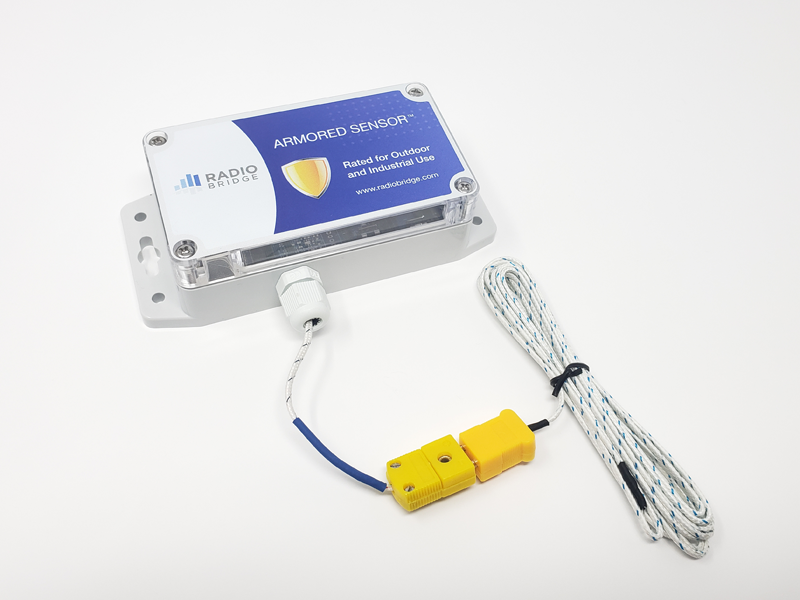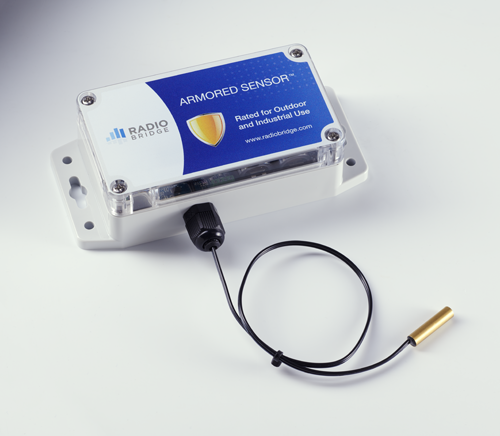Wireless Industrial Sensors
Wireless sensors for industrial standards such as 4-20mA current loops, DIO, and more.
Wireless Thermocouple Temperature Sensor
The wireless thermocouple temperature sensor measures temperature using an external K-type thermocouple. Other thermocouples may be used and can be configured via downlink messages. Temperature reporting can be based on thresholds, report-on-change, and periodic messaging.
Wireless Outdoor/Industrial External Probe Temperature Sensor
The external probe temperature sensor measures temperature using an external temperature probe. If the temperature rises above or falls below the configured thresholds, an alert is sent over the wireless network.
As automation continues to grow in industrial environments, one component is critical in that transformation — wireless sensors. Wireless industrial sensors make it possible to easily gather data points in rugged environments, enabling greater productivity and more accurate operations, among other benefits. There are many different types of sensors, but most of them work within the Internet of Things (IoT) to deliver their findings.
What Are Industrial Sensors in the context of IoT?
The IoT is a wide-reaching term that covers expansive networks of physical objects that connect and exchange information with systems or other devices through the cloud. You may have several IoT devices just within your home, such as smart speakers or alarm systems, but we're talking about industrial sensors, which fall under the Industrial Internet of Things (IIoT) and have key roles to play.
Industrial sensors can accomplish many different tasks, like monitoring temperatures, measuring air quality and detecting movement. A manufacturer, for example, might use an industrial sensor to detect when ambient temperatures exceed the point at which they would cause damage to a product. Many industrial operations employ a wide range of sensors at different points in the process. Different categories include proximity sensors, liquid sensors, push-buttons, optical sensors and many others.
Some qualities that make wireless sensors especially beneficial for industrial environments include:
- Exceptional battery life: If sensors go down, they can create significant downtime, and for facilities with many sensors in play, it's just not feasible to be changing batteries every month or even every year. That's why industrial sensors are built for long battery life, sometimes running for up to 10 years on a single battery.
- Long-range performance:Industrial facilities can be incredibly large, so running wires or adding additional connectivity devices can be expensive, complicated and risky. Sensors with longer ranges eliminate this concern and can communicate effectively across the building.
- Affordability:Like every business, industrial organizations are working on a budget. Industrial sensors need to be low-cost without sacrificing build quality. It's also helpful if they already meet requirements set by the Federal Communications Commission and the LoRa Alliance, so you don't have to pay for additional, costly certification.
How Do Wireless Industrial Sensors Work?
Wireless industrial sensors typically monitor specific parameters in their physical surroundings. A temperature sensor, for example, might be triggered when it hits a certain threshold. At that point, the sensor creates an output, like a wireless signal, that gets sent to a receiver. From there, the outputs can be used to trigger events such as system modifications or alerts.
There are many different foundational protocols that make industrial sensors run, like the familiar options of Bluetooth and Wi-Fi, but in industrial applications the new standard is LoRa or LoRaWAN. LoRa is a shortening of "long range" and is a type of technology used in low-power wide-area networks (LPWANs). LPWAN technology allows the devices to send small pieces of data over long distances, and LoRa enables transmission of larger data packets, especially in noisy environments. LoRaWAN refers to a network protocol based on LoRa.
Industrial Sensors From Radio Bridge
Here at Radio Bridge, sensors are our specialty. We manufacture a wide range of sensor products, all built to high standards of quality on LoRaWAN technology to meet the unique needs of industrial customers.
Browse our products at the links below or reach out to us if you have any questions.


